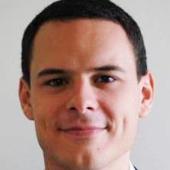Dissertation with Christian-Nils Åkerberg "Driver interaction with vulnerable road users: Modelling driver behaviour in crossing scenarios"
Christian-Nils Åkerberg Boda will defend his thesis: "Driver interaction with vulnerable road users: Modelling driver behaviour in crossing scenarios". Christian-Nils is a doctoral student at Crash Analysis and Prevention/Vehicle Safety/Mechanics and Maritime Sciences. The opponent is Otto Lappi from University of Helsinki.
The grading committee includes:
Tania Duktic Willstrand, SWECO
Michiel Van Ratingen, Euro NCAP
Fredrik Bruzelius, VTI/Chalmers
Monica Lundh, Chalmers
A light lunch will be served after the defense. If you want to join the lunch, please let Sonja (sonja.laakso@chalmers.se) know by December 13th.
Welcome!
Abstract
Every year, more than 5000 pedestrians and 2000 cyclists die on European roads. These vulnerable road users (VRU) are at especially high risk when interacting with motorized vehicles. Intelligent safety systems (ISSs) designed to mitigate or avoid crashes with VRU started to enter the market a few years ago, and still need to be improved to be effective in all scenarios. Understanding how drivers interact with VRU is crucial to improve the development and the evaluation of ISSs. Today, however, there is a lack of knowledge about driver behaviour in interactions with VRU, which keeps ISSs from expressing their full potential. This thesis has multiple objectives: 1) investigate and describe the driver response process when a VRU crosses the driver path, 2) devise models that can predict driver response process, 3) inform Euro NCAP with new knowledge about driver interactions with crossing VRU to guide the development of their test scenarios, and 4) develop a framework for ISS safety benefits evaluation through counterfactual simulations. Results showed that the moment in which a VRU becomes visible to the driver has the largest influence on the driver braking response process in driver-VRU interactions. Data gathered in driving simulators and on a test track was used to devise different predictive models; one model for the crossing-pedestrian scenarios, and three models for the crossing-cyclist scenarios. For the crossing-pedestrian scenario, the devised model can evaluate the moment at which key components of the driver response process(e.g. gas pedal fully released, and brake onset) may happened given seven different factors. For the crossing-cyclist scenario, the first model predicts the brake onset given the cyclist appearance time, the second model predicts the experienced discomfort score given the cyclist appearance time, and the third model predicts the drivers brake pedal deflection continuous signal based on cues visually perceived. The latter model is the most comprehensive model developed in this thesis and predict brake pedal deflection depending on the interaction of two visual cues (looming and projected post-encroachment time).These models should be used to improve the design and evaluation of ISSs. The models could, indeed, inform the ISS about warning or intervention times that are not a nuisance to the drivers, therefore maximizing ISS acceptance. Additionally, the models could be used in counterfactual simulations to evaluate ISS safety benefits. Such an evaluation framework, using counterfactual simulations, was developed which is suitable for evaluating safety benefits and refining ISS (such as autonomous emergency braking and frontal collision warning). Driver models were shown to be a critical part of such counterfactual simulations, supporting further the development of more realistic and ecologically-valid driver models. This thesis not only provides new knowledge on the driver response process when a VRU crosses their path, but it delivers as well this knowledge in the form of driver models that can be used to improve the design and evaluation of ISS. The new knowledge may also guide Euro NCAP towards an improved ISS test protocol by suggesting the introduction of scenarios that are not yet evaluated.

